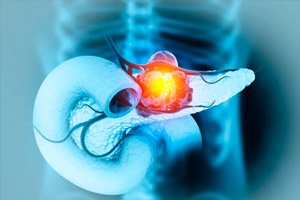
All iLive content is medically reviewed or fact checked to ensure as much factual accuracy as possible.
We have strict sourcing guidelines and only link to reputable media sites, academic research institutions and, whenever possible, medically peer reviewed studies. Note that the numbers in parentheses ([1], [2], etc.) are clickable links to these studies.
If you feel that any of our content is inaccurate, out-of-date, or otherwise questionable, please select it and press Ctrl + Enter.
Ketogenic diet may improve the efficacy of pancreatic cancer therapy
Last reviewed: 02.07.2025
 ">
">Scientists at the University of California, San Francisco (UCSF) have discovered a way to kill pancreatic cancer in mice by putting them on a high-fat, or ketogenic, diet and giving them cancer therapy.
The therapy blocks fat metabolism, which is the only source of energy for cancer cells, while the mice remain on a ketogenic diet, and the tumors stop growing.
The team made the discovery, published in the journal Nature, as they tried to understand how the body manages its existence on fat during fasting.
"Our findings lead us directly to the biology of one of the deadliest cancers, pancreatic cancer," said Davide Ruggiero, PhD, professor and American Cancer Society research fellow in the UCSF departments of urology and cellular and molecular pharmacology and senior author of the paper.
Ruggiero's team first figured out how a protein known as eukaryotic translation initiation factor 4E (eIF4E) alters the body's metabolism to burn fat during fasting. The same switch is flipped by eIF4E when the animal is on a ketogenic diet.
They found that a new anti-cancer drug called eFT508, which is currently in clinical trials, blocks eIF4E and the ketogenic pathway, preventing the body from metabolizing fats. When the scientists combined the drug with a ketogenic diet in an animal model of pancreatic cancer, the cancer cells began to starve.
"Our findings reveal a point of vulnerability that can be treated with a clinical inhibitor that we already know is safe in humans. We now have compelling evidence for one way to use diet along with existing cancer treatments to precisely target tumors," Ruggiero said.
Using different types of fuel in a cell
People can survive without food for weeks, partly because the body burns stored fat.
During fasting, the liver converts fats into ketone bodies, which are used instead of glucose, the body’s normal energy source. Ruggiero’s team found that eIF4E in the liver becomes more active even when the liver pauses its other metabolic activities, suggesting that the factor is involved in creating ketone bodies, a process called ketogenesis.
“Fasting has been part of various cultural and religious practices for centuries and is thought to promote health,” said Haojun Yang, PhD, a postdoctoral fellow in Ruggiero’s lab and first author of the study. “Our discovery that fasting rewires gene expression provides a potential biological explanation for these benefits.”
By tracking changes in various metabolic pathways during fasting, the scientists found that eIF4E is activated by free fatty acids, which are released by fat cells at the onset of fasting so that the body has something to consume.
“The metabolite that the body uses for energy is also used as a signaling molecule during fasting,” Ruggiero said. “As a biochemist, seeing a metabolite act as a signal was the most amazing thing.”
These same changes in the liver—the production of ketone bodies from burning fat, along with increased eIF4E activity—also occurred when lab animals were fed a ketogenic diet consisting mostly of fat.
That's when the "light bulb" went on.
"Once we could see how this pathway worked, we saw the opportunity to intervene," Ruggiero said.
The Achilles Heel of Pancreatic Cancer
Scientists initially treated pancreatic cancer with an anti-cancer drug called eFT508, which disables eIF4E, in an attempt to block tumor growth. However, the pancreatic tumors continued to grow, using other fuel sources, such as glucose and carbohydrates.
Knowing that pancreatic cancer can survive on fat and that eIF4E becomes more active when fat is burned, the scientists first put the animals on a ketogenic diet, forcing the tumors to consume only fat, and then applied the anti-cancer drug. In this context, the drug turned off the cancer cells’ only source of nutrition, and the tumors shrank.
Ruggiero, along with Kevan Shokat, PhD, professor of cellular and molecular pharmacology at UCSF, developed eFT508 in the 2010s, and it showed some promise in clinical trials. But now there’s a much more powerful way to use it.
“The research field has long struggled to firmly connect diet to cancer and cancer treatments,” Ruggiero said. “But to connect these things productively, you have to understand the mechanism.”
Treatment for other forms of cancer will require different combinations of diets and medications.
"We expect that most cancers have other vulnerabilities," Ruggiero said. "This is the basis for a new way to treat cancer with diet and personalized therapies."
